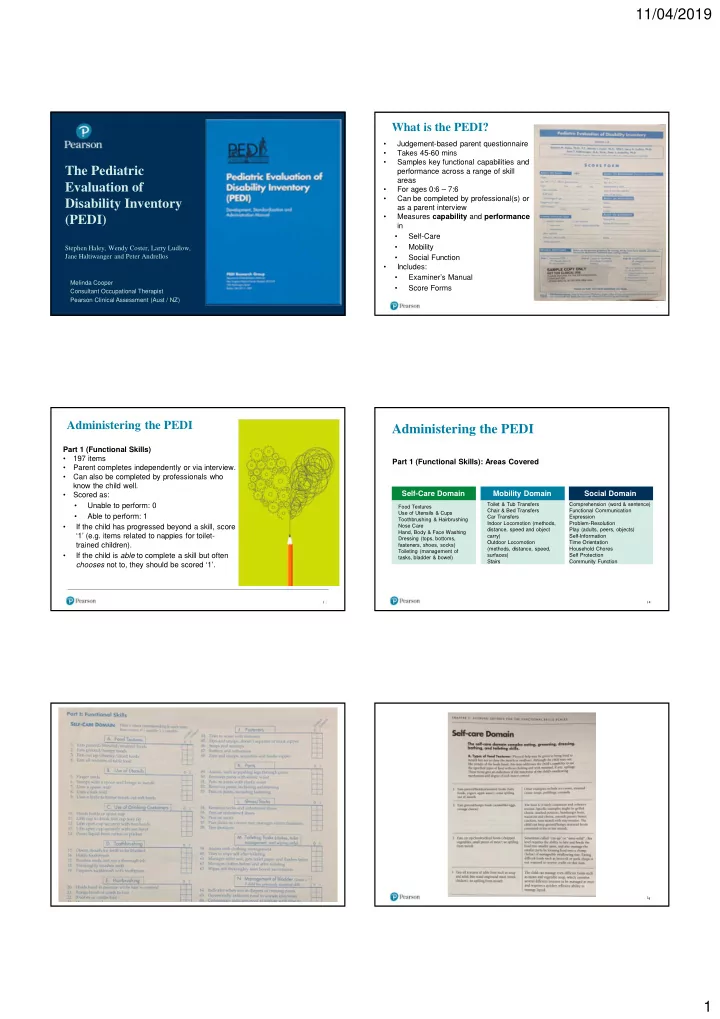

11/04/2019 What is the PEDI? • Judgement-based parent questionnaire • Takes 45-60 mins • Samples key functional capabilities and The Pediatric performance across a range of skill Evaluation of areas • For ages 0:6 – 7:6 Disability Inventory • Can be completed by professional(s) or as a parent interview (PEDI) Measures capability and performance • in • Self-Care Stephen Haley, Wendy Coster, Larry Ludlow, • Mobility Jane Haltiwanger and Peter Andrellos • Social Function • Includes: • Examiner’s Manual • Melinda Cooper • Score Forms • Consultant Occupational Therapist • Pearson Clinical Assessment (Aust / NZ) 2 Administering the PEDI Administering the PEDI Part 1 (Functional Skills) • 197 items Part 1 (Functional Skills): Areas Covered • Parent completes independently or via interview. • Can also be completed by professionals who know the child well. Self-Care Domain Mobility Domain Social Domain • Scored as: Toilet & Tub Transfers Comprehension (word & sentence) • Unable to perform: 0 Food Textures Chair & Bed Transfers Functional Communication Use of Utensils & Cups • Able to perform: 1 Car Transfers Expression Toothbrushing & Hairbrushing Indoor Locomotion (methods, Problem-Resolution • If the child has progressed beyond a skill, score Nose Care distance, speed and object Play (adults, peers, objects) Hand, Body & Face Washing ‘1’ (e.g. items related to nappies for toilet- carry) Self-Information Dressing (tops, bottoms, Outdoor Locomotion Time Orientation trained children). fasteners, shoes, socks) (methods, distance, speed, Household Chores Toileting (management of If the child is able to complete a skill but often • surfaces) Self Protection tasks, bladder & bowel) chooses not to, they should be scored ‘1’. Stairs Community Function 4 3 5 6 1
11/04/2019 Administering the PEDI Continued Administering the PEDI Parts 2 & 3 (Caregiver Assistance & Modification) Parts 2 & 3 (Caregiver Assistance & Modification) • 20 items • Ideally administered as parent interview • For Caregiver Assistance, ratings are based on the Caregiver Assistance scored as: • level of help the parent actually and routinely gives, • Independent: 5 regardless of what the child is able to do. • Supervision: 4 • Minimal Assistance: 3 • The Modifications section does not contribute to the • Moderate Assistance: 2 scores but still provides good information. • Maximal Assistance: 1 • Modifications should only be counted when the child • Total Assistance (Dependent): 0 Modification scored as: • needs the equipment as opposed to a child who • None: N prefers the equipment but can do the skill without it. • Child-oriented: C • Rehabilitation Equipment: R • Extensive Modifications: E 7 8 Administering the PEDI Parts 2 & 3 (Caregiver Assistance & Modifications): Areas Covered Self-Care Domain Mobility Domain Social Domain Eating Chair/Toilet Transfers Functional Comprehension Grooming Car Transfers Functional Expression Bathing Bed Transfers Joint Problem Solving Dressing (upper & lower body) Tub Transfers Peer Play Toileting Indoor Locomotion Safety Bladder Management Outdoor Locomotion Bowel Management Stairs 9 10 Interpreting the PEDI Assistance/Modifications scoring examples • Normative Standard Scores have a mean of 50 and a standard deviation of 10. • Normative Standard Scores provide a measure of the child’s overall performance relative to his or her peers. • Normative Standard Scores should not be used for children over 7.5 • Items in each scale are arranged developmentally so look for outliers 11 12 2
11/04/2019 Pros and Cons of the PEDI Interpreting the PEDI Pros • Scaled scores provide an estimate of the child’s functional performance Top-down approach • along the continuum of items that make up a particular scale. Sensitive to change even in severely delayed children through • • Scaled scores range from 0-100. scaled scores • Scaled scores provide a way to track progress, particularly is Documents functional delay • performance is severely delayed and the child will consistently score Promotes parent involvement below average. • Minimal training and low cost • • Item maps can be used to identify which skills are likely Cons to be within a child’s ability Lengthy administration • and can assist with goal Small normative sample size setting • Doesn’t measure quality of performance • Skills are at the lower end of the continuum • Items focused primarily on home-based activities • 13 14 Clinical utility of the PEDI PEDI-CAT • Detecting and quantifying a functional deficit Computer adaptive test (CAT): uses AI to • select only the most relevant items to or delay administer • Identifying strengths and weaknesses in daily Age range birth – 21 years • living skills New items • ‘Responsibility’ section • Informs top down goal setting and intervention • Uses a 4-point scale • • Evidence-based tool for demonstrating Takes between 10-40 mins • progress of child relative to him/herself Available for PC and iPad • • Useful for children with developmental delays 15 16 Thanks for your attention! Any questions? melinda.cooper@pearson.com 0407 259 317 17 3
Recommend
More recommend